Dairy Free Alternative Milk Comparison: What's Best for You?
Are you ready to ditch the dairy? If you’re on the fence about switching from regular milk to non-dairy alternatives, we’re here to help with all the facts and benefits you need to know. There are many reasons as to why you may consider making the switch such as lactose allergies, sensitivities or a health condition. Luckily, the market of alternative, non-dairy milk has grown rapidly over the last several years, leaving us with many options to choose from depending on our personal preferences and taste buds.
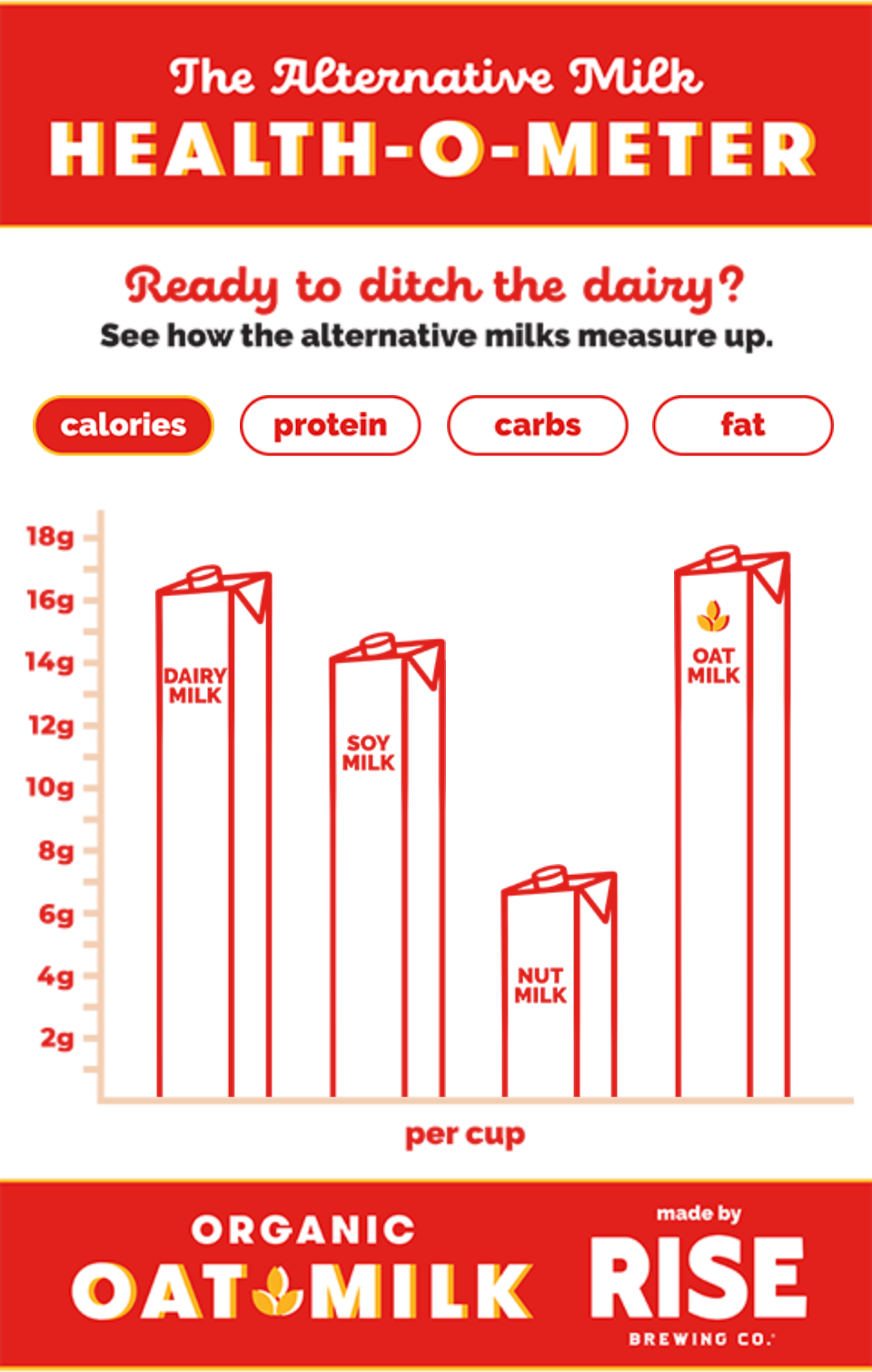
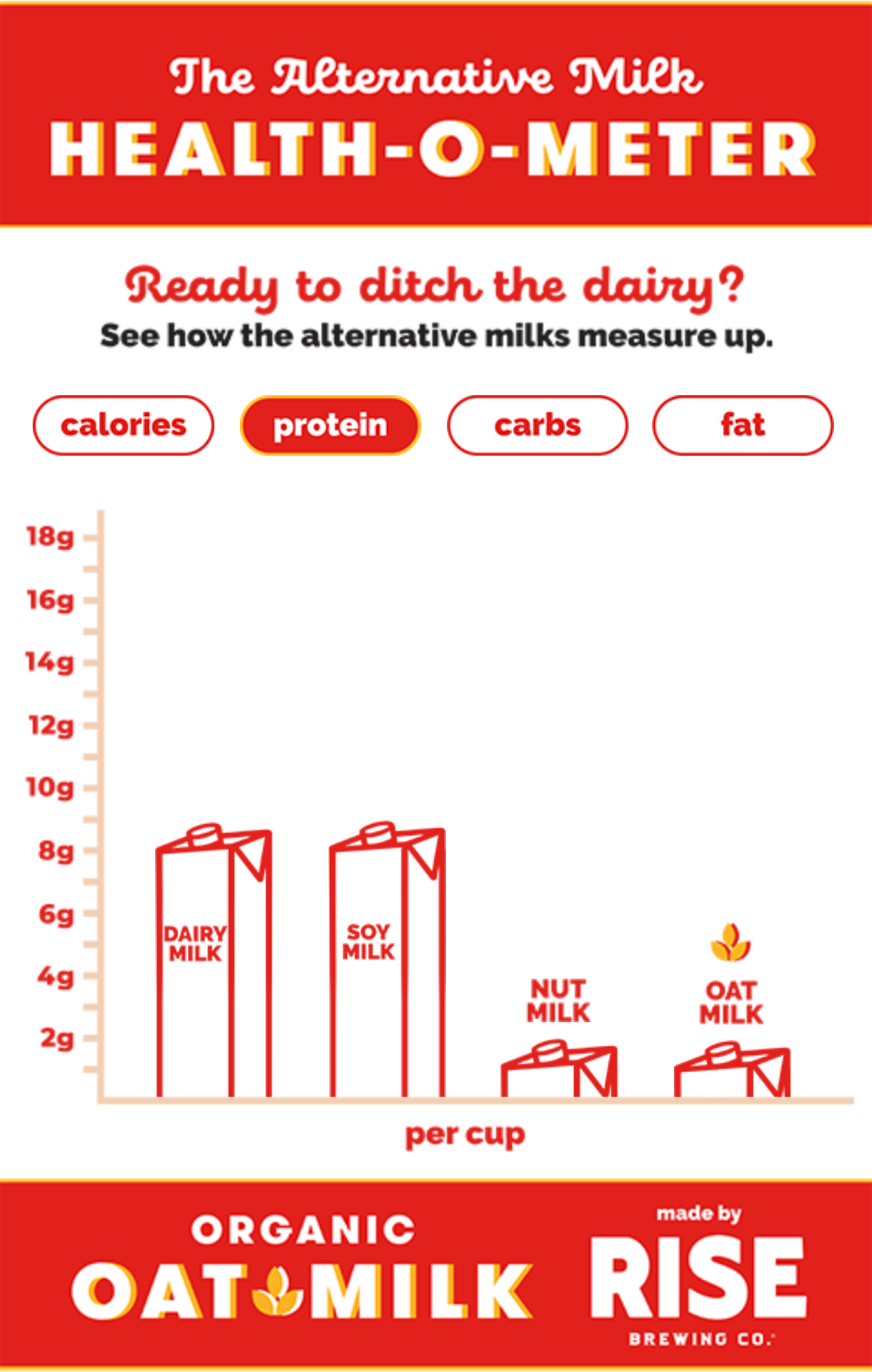
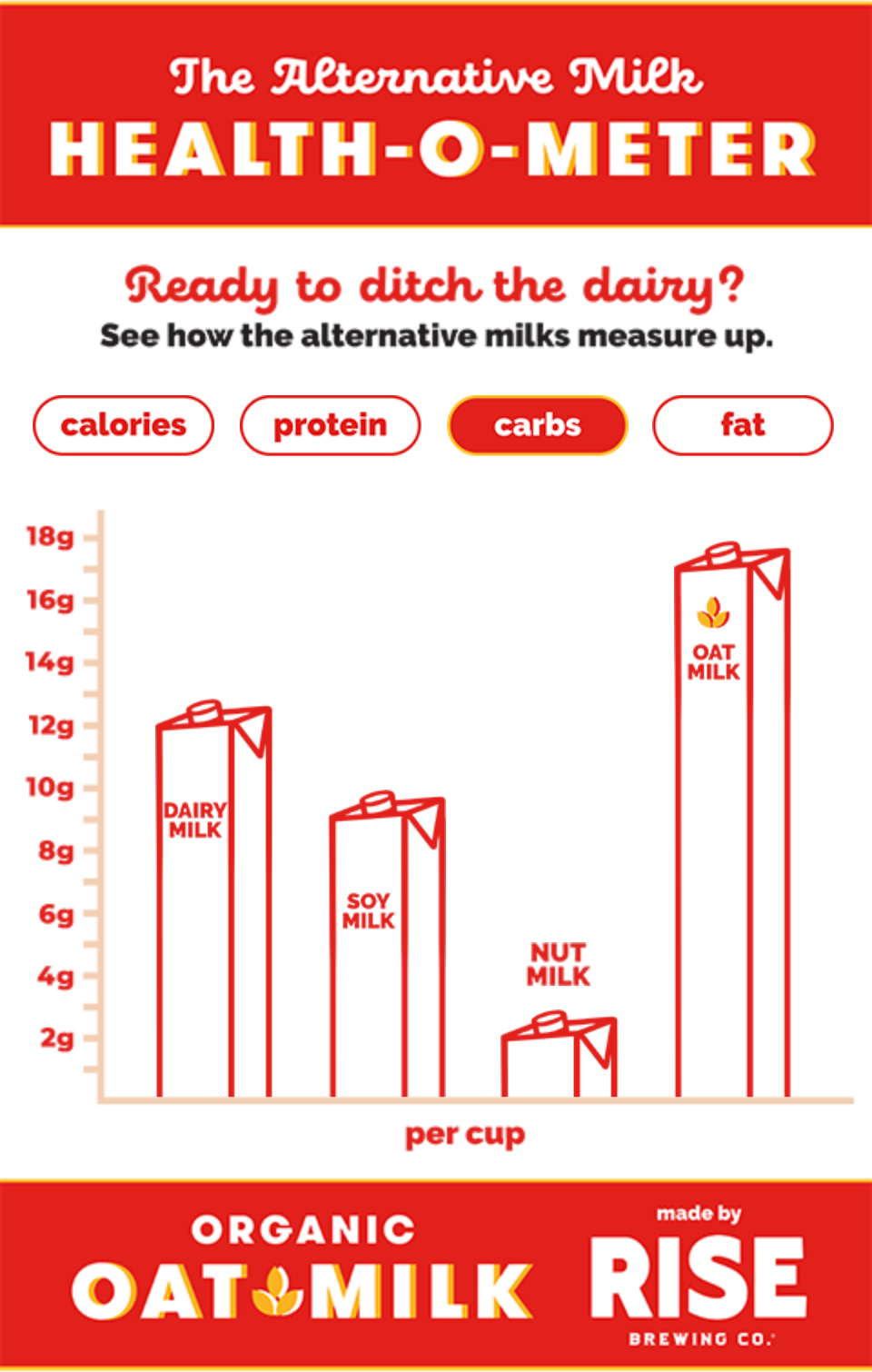
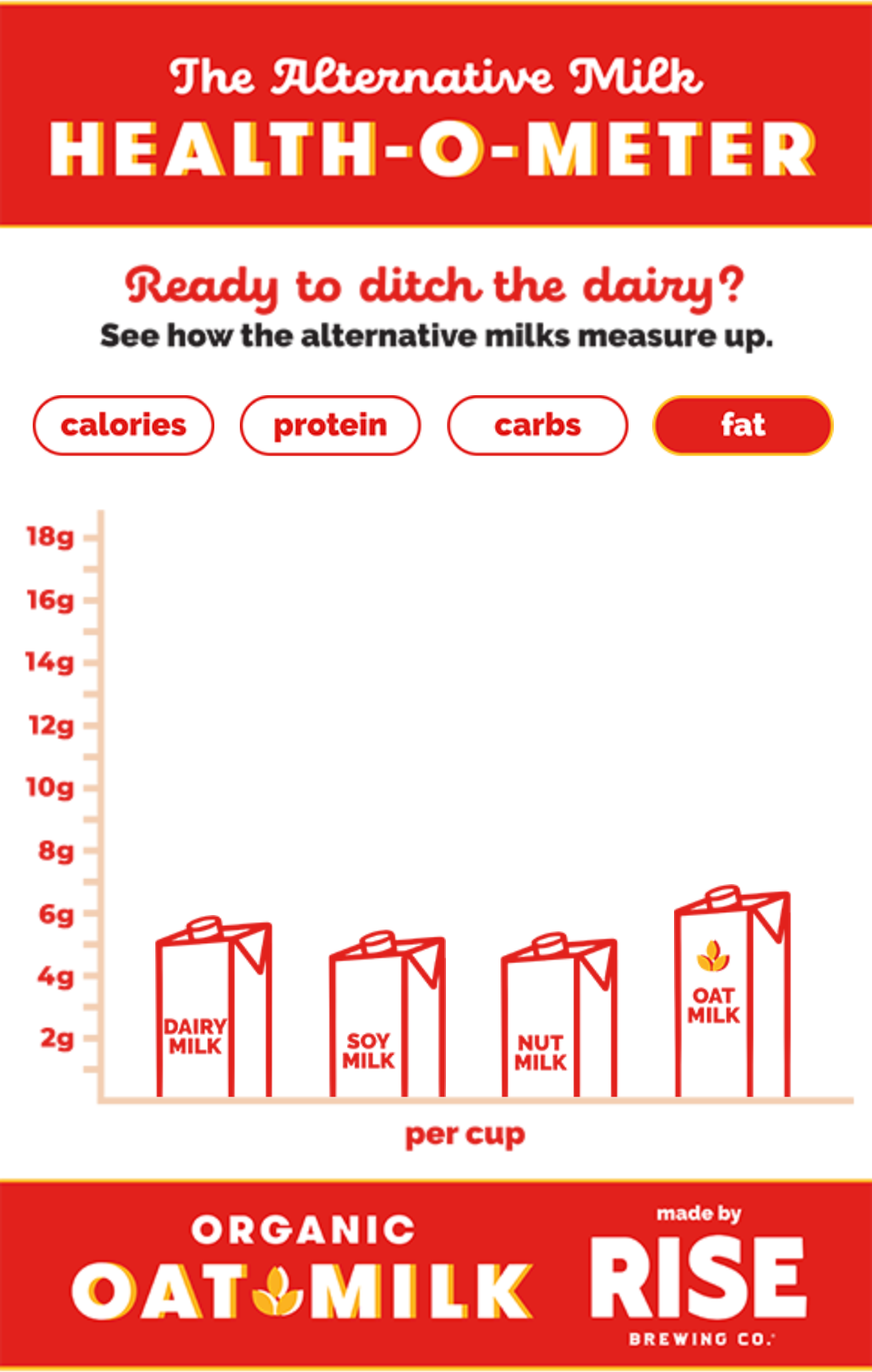
Compare and contrast four alternative milks: cashew, soy, almond and oat. As you use the tool, you can view the nutritional information for each milk in terms of calories, protein, carbs and fat. Each value is based per cup of each non-dairy milk choice. Now that you have an idea of how each milk stacks up, let’s dive deeper into the health benefits of these alternative milks.
The Health Benefits of Alternative & Non-Dairy Milk
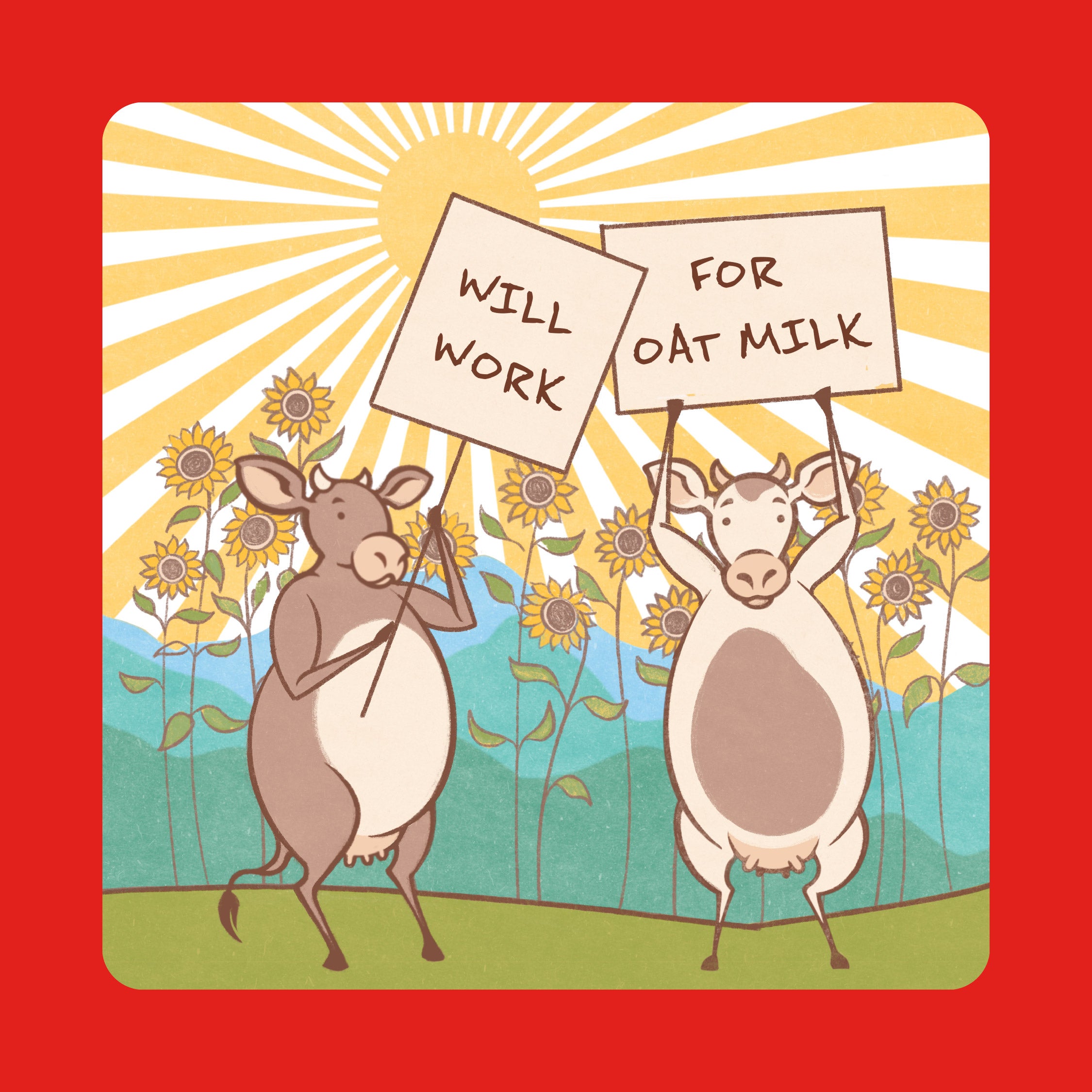
Oat Milk
Have you ever wondered: Is Oat Milk Healthy? Or is Oat Milk Good For You? With oat milk gaining a great amount of popularity over the years, it has many of us wondering if oat milk is a healthy substitute for dairy milk. Here are the powerful benefits of oat milk:
Oat Milk Is a Great Alternative For People With Allergies
Oat Milk is naturally free of nuts, lactose, soy and gluten (if made from gluten-free oats). And, it’s vegan.
Could Lower Blood Cholesterol
Oat milk has healthy heart benefits. This is because it contains a higher concentration of beta-glucans which reduces cholesterol absorption.
This can help lower bad LDL cholesterol that has been tied to heart disease.

Good For Your Bones
We all know you need healthy and strong bones. But, that doesn’t mean you need dairy in your diet. Oat milk is fortified with calcium and Vitamin D which are great for your bones.
Calcium and Vitamin D are interconnected in their process. Vitamin D aids in the absorption of calcium in your digestive tract. If you’re low on either of these minerals, your bones can become increasingly weak.
Rich in B Vitamins
Oat Milk is fortified with B vitamins, specifically B2 (riboflavin) and B12.
B Vitamins are important for your health and have shown to improve your mood, combat oxidative stress and promote healthy skin, hair and nails.

Cashew Milk
If oats, soy or almonds aren’t your thing - why not try out cashew milk? Cashew milk has a creamy consistency and makes for a great stand alone drink or additive to your morning coffee. Here are some of the health benefits of cashew milk:
It’s Nutrient Dense
Cashew Milk contains a handful of essential nutrients including unsaturated fats, proteins, vitamins and minerals. And, it's packed with magnesium which is an important mineral that can aid in improved nerve function, regulating blood pressure and maintaining good heart health.

Good For Your Heart
Cashew milk is loaded with polyunsaturated and monounsaturated fatty acids, which can both help with decreasing your chance of having heart disease.
It May Help You See Better
Did you know that drinking cashew milk is actually good for your eyes? It contains the antioxidants lutein and zeaxanthin which function to prevent cell damage to your eyes.
Studies show that when consuming these antioxidants, you have a better chance of reducing age related macular degeneration that leads to retinal damage.
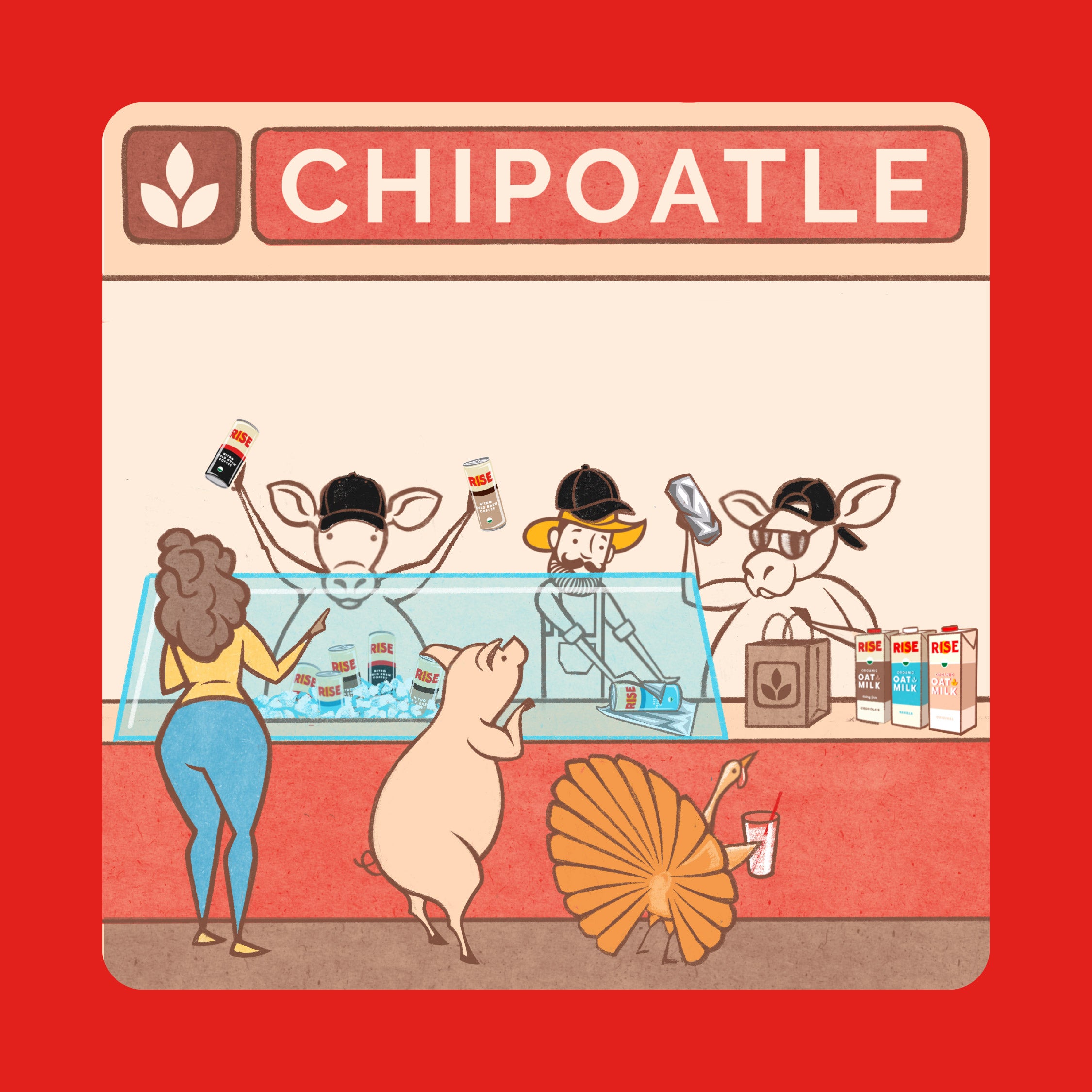
Improves Your Skin
Drinking cashew milk may even help your skin. Ditch the creams and try cashews.
They're loaded with copper which is a nutrient that is vital to skin proteins. And, it aids in the production of collagen and elastin - which are two factors that make your skin look tight and free of aging.
Could Help With Blood Clots
Another vitamin that is found in cashew milk is Vitamin K.
If you have a lack of Vitamin K due to health issues such as IBD, then drinking cashew milk may be helpful. You should always consult a doctor if you have any malabsorption issues before changing your diet.

Soy Milk
Another dairy alternative is soy milk, which is made from soybeans. Here are the health benefits of drinking soy milk:
Help With Brain Health
Soy Milk contains high levels of omega-3 fatty acids. These are healthy fats that our bodies cannot produce on their own.
Omega-3 fatty acids have been known to reduce Alzheimer’s and dementia.
Good For Your Heart
Another ingredient in soy milk is potassium which is important for good heart health. It can help you lower your blood pressure as well as cholesterol levels.

For Women, It Can Reduce Menopause Symptoms
Women going through menopause often experience hot flashes. Drinking soy milk may help reduce these due to the fact that it contains isoflavones which are part of chemicals known as phytoestrogens. The isoflavones react in the body like a weaker form of estrogen, which in turn - helps decrease hot flashes. Almond Milk
Almond Milk is one of the most popular alternative milk options. It has a nutty, creamy flavor.
Here are a few benefits of Almond Milk:
Low In Calories
For those who want to maintain their current weight, drinking almond milk is the way to go. A cup of almond milk only contains 39 calories.
If you want to make sure that your almond milk is giving you the best health benefits, select an option that is unsweetened and does not contain added sugars.

Could Help Strengthen Your Bones
If your almond milk is enriched with calcium, then it could help with your bone strength. When enriched, it could contain 37% or more of your daily nutritional calcium needs.
This makes it a great option for vegans or individuals who are allergic to lactose or milk.
Lower The Risk Of Heart Disease
Almond Milk is packed full of healthy fats. Due to this, it can contribute to a reduced risk of heart disease.
Almond milk contains oleic acid which has shown to help with blood lipids. Therefore, when blood lipids change in a positive way, it can lead to a reduced risk or heart disease.
Additionally, almond milk is high in Vitamin E which contains anti-inflammatory and antioxidants that are good for your heart.

Almond Milk
Almond Milk is one of the most popular alternative milk options. It has a nutty, creamy flavor.
Here are a few benefits of Almond Milk:
Low In Calories
For those who want to maintain their current weight, drinking almond milk is the way to go. A cup of almond milk only contains 39 calories.
If you want to make sure that your almond milk is giving you the best health benefits, select an option that is unsweetened and does not contain added sugars.

Could Help Strengthen Your Bones
If your almond milk is enriched with calcium, then it could help with your bone strength. When enriched, it could contain 37% or more of your daily nutritional calcium needs.
This makes it a great option for vegans or individuals who are allergic to lactose or milk.
Lower The Risk Of Heart Disease
Almond Milk is packed full of healthy fats. Due to this, it can contribute to a reduced risk of heart disease.
Almond milk contains oleic acid which has shown to help with blood lipids. Therefore, when blood lipids change in a positive way, it can lead to a reduced risk or heart disease.
Additionally, almond milk is high in Vitamin E which contains anti-inflammatory and antioxidants that are good for your heart.
The Best Alternative & Non-Dairy Milks For Health Conditions
Now that we’ve covered several benefits of oat, cashew, soy and almond milk - let’s talk about the best alternative milks for various health conditions.
What Is The Best Milk For High Cholesterol?
The Best Milks for high cholesterol are ones that are low in fat. These include:
- Soy milk which contains no cholesterol and is low in saturated fat. It also has 7 grams of protein per serving. According to the National Institutes of Health, 25g per day of soy protein could reduce your risk of heart disease.
- Almond Milk which also contains no cholesterol or saturated fat. They are heart healthy and low in calories with about 40 calories per cup. It also contains polyunsaturated fatty acids which are proven to lower LDL cholesterol and reduce inflammation. Make sure to avoid any almond milk that contains added sugar.
- Oat milk contains beta-glucans, a soluble fiber that has heart health benefits. Once inside the heart, beta-glucans bind to cholesterol and reduce its absorption.
What Is The Best Milk For Diabetes?
If you have diabetes, you need to pay attention to the saturated fats, carbohydrates and sugar in the milk you choose. Here are the best milk options for Diabetes:
- Almond Milk that is unsweetened is a great choice for those with Diabetes. It is low in calories, has 2 grams of carbs and zero saturated fat.
- Soy Milk that is unsweetened is another option as it’s high in calcium, packed with B12 and only has 4 grams of carbs per cup.
What Is The Best Milk For Acid Reflux?
If you have acid reflux, it can be difficult to determine which foods and drinks your body is sensitive to. According to research, here are the best plant based milks for acid reflux:
- Almond Milk is great for Acid Reflux because of its alkaline composition. This helps with lowering and neutralizing the acid in your stomach, which relieves your reflux.
- Soy milk is lower in fat than normal milk, which is helpful for people with GERD.
- Any plant-based milk should help reduce Acid Reflux
- If you have GERD, try to avoid any non-dairy milks that may contain carrageenan as it could contribute to your digestive issues.
What Is The Best Milk For Acne?
Do you often deal with skin breakouts and issues? Dairy can often be the cause of skin problems. To get your skin back on track, here are the best alternative milks for acne:
- Coconut Milk is a great option for those who suffer from acne. It is anti-inflammatory, contains healthy fats, is gut friendly and has magnesium and potassium.
- Almond Milk, if unsweetened, is also a good alternative because it contains antioxidants, is anti-inflammatory and made up of healthy fats. If you have a tree nut sensitivity, avoid almond milk as it may increase your acne issues.
- Cashew Milk can also be consumed because it is anti-inflammatory, has healthy fats and contains low amounts of carbs.
What Is The Best Milk For Bloating?
If you experience bloating after drinking dairy, you most likely are sensitive or intolerant to lactose or milk. To avoid the uncomfortable feelings of bloating, here are the best non-dairy milks you should try:
- Oat Milk is a great option because it doesn’t contain carrageenan which is often found in almond or coconut milk as an emulsifier. To keep your gut in check, find oat milk with the cleanest ingredients and avoid any brands that are synthetic or processed.
What Is The Best Milk For Constipation?
Constipation is an uncomfortable problem for many individuals. If you’re sensitive to lactose or milk, drinking dairy may increase your constipation. To reduce these symptoms, try a non-dairy option instead:
- Oat Milk is a great choice for those who suffer from constipation. This is because it contains high levels of fiber which relieve constipation, soothe irritable bowel syndrome (IBS) and even may lower the chance of getting colorectal cancer. By reducing constipation, the fiber in oat milk could potentially prevent hemorrhoids and hernias.
What Is The Best Milk For Lactose Intolerance?
Lastly, if your reason for ditching dairy is due to a lactose intolerance then plant based, non-dairy milks are your only option. Here are the best milks to substitute if you have lactose intolerance:
- Soy Milk: Made from soybeans, it has a creamy taste and has a similar nutritional composition to that of cow’s milk.
- Almond milk: Low in calories, nutty in flavor. Always choose an unsweetened version to avoid added sugars.
- Coconut Milk: Milk-like consistency, sweet taste. The MCTs (medium-chain triglycerides) in coconut milk may help with weight loss and cholesterol levels.
- Oat Milk: High in protein and fiber, oat milk contains beta-glucan which can help lower cholesterol and blood sugar levels.
- Cashew Milk: Low in calories, carbohydrates and sugar - it is rich and creamy with a nutty flavor.
As you can see, oat milk, almond milk and other non-dairy, alternative milk options such as cashew and soy have many health benefits. Additionally, they each play a role in fighting certain diseases and decreasing health issues.
Ready to test out our dairy-free Oat Milk made with only 4 ingredients?

